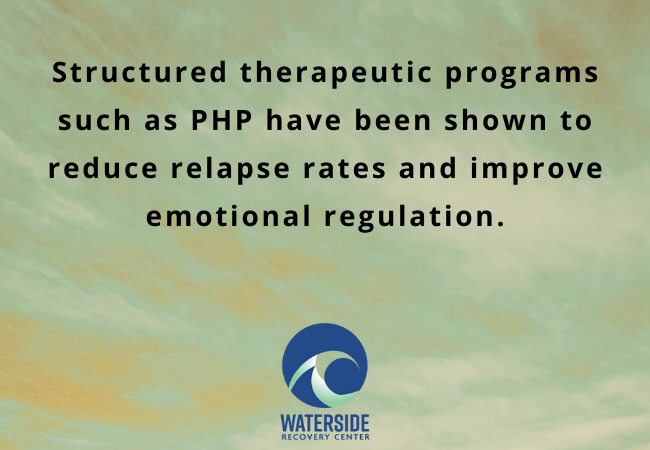Addiction recovery is a journey of rebuilding. At the center of that journey lies therapy—guiding people from chaos to clarity. At Waterside Recovery, our Partial Hospitalization Program (PHP) offers intensive support without the confinement of inpatient care, and therapy is the cornerstone of that healing process.
Whether you’re overcoming alcohol, opioids, or another substance, PHP offers a powerful combination of structure, flexibility, and evidence-based therapy. Let’s explore why therapy matters so much—and how it transforms lives every day in our Day Treatment Program in Massachusetts.
Understanding Partial Hospitalization Programs (PHP)
A Partial Hospitalization Program (PHP), also referred to as a Day Treatment Program, offers a level of care between inpatient treatment and traditional outpatient care. At Waterside Recovery, PHP typically involves 5-6 hours of treatment each day, five days a week.
This format allows individuals to engage in intensive therapeutic work while still living at home or in a supportive sober living environment.
Key features of our PHP include:
- Comprehensive therapy sessions
- Medical and psychiatric oversight
- Group counseling
- Relapse prevention planning
- Life skills training
- Dual diagnosis treatment
It’s ideal for clients who need more support than an Outpatient Treatment Program in Massachusetts provides, but who do not require 24/7 supervision.
Why Therapy Is the Foundation of Recovery
Substance use isn’t just about the substance. It’s about trauma, pain, mental health, and coping mechanisms. Therapy helps unravel those underlying issues and provides tools to build a stronger, sober future.
Therapy in PHP helps clients:
- Understand their addiction
- Identify triggers and negative thought patterns
- Replace destructive behaviors with healthy ones
- Build a support network
- Develop strategies for relapse prevention
- Heal trauma and mental health issues
Now, let’s break down the various types of therapy and why they matter.
1-on-1 Therapy: Addressing Unique Personal Challenges
Individual therapy is where deep, personal healing begins. Clients meet regularly with a licensed therapist to explore the root causes of their substance use.
Therapeutic approaches often include:
- Cognitive Behavioral Therapy (CBT) – To challenge negative thinking and create healthier behavior patterns.
- Motivational Interviewing (MI) – To strengthen a client’s personal motivation to change.
- Acceptance and Commitment Therapy (ACT) – To help clients accept thoughts and feelings rather than fight them.
- Person-Centered Therapy – To support self-actualization in a non-judgmental space.
This tailored care is especially effective in our Drug Addiction Treatment Program in Massachusetts, where each person’s story is unique.
Group Therapy: Building Peer Support and Shared Growth
In our Afternoon Treatment Program in Massachusetts, group therapy sessions play a crucial role. These groups are guided by clinicians and are both educational and interactive.
Common group themes include:
- Emotional regulation
- Coping strategies
- Stress and anxiety management
- Relapse prevention
- Conflict resolution
- Self-esteem and identity
Benefits of group therapy:
- Shared accountability
- Reduced isolation
- Peer insight and encouragement
- Opportunity to practice interpersonal skills
Many clients find strength in community during group sessions—and this collective healing is vital in long-term recovery.
Family Therapy: Healing Relationships Damaged by Addiction
Addiction doesn’t happen in a vacuum. It affects everyone in the family system.
Family therapy helps address:
- Broken trust
- Communication breakdowns
- Boundary issues
- Enabling and codependency
- Emotional wounds from past behavior
By repairing these relationships in therapy, families become part of the recovery team. This support can be a powerful relapse prevention tool.
Dual Diagnosis and Integrated Mental Health Therapy
Many people dealing with addiction also suffer from mental health conditions such as:
- Depression
- Anxiety
- PTSD
- Bipolar disorder
- ADHD
At Waterside Recovery, we offer dual diagnosis care that treats both conditions simultaneously. This is especially critical in PHP settings, where clients with complex emotional and psychiatric needs require more intensive therapeutic support than a standard Outpatient Treatment Program in Massachusetts can offer.
Trauma-Focused Therapy: Resolving the Past to Empower the Future
Unresolved trauma is a common driver of substance use.
Our PHP includes trauma-informed practices like:
- Eye Movement Desensitization and Reprocessing (EMDR)
- Somatic Experiencing
- Narrative Therapy
- Internal Family Systems (IFS)
These therapies allow clients to process traumatic memories in a safe environment and begin to heal emotional wounds that fuel addiction.
Holistic and Skill-Building Therapies in PHP
Recovery isn’t just about staying sober—it’s about building a life worth living.
That’s why our PHP includes:
- Mindfulness and meditation for emotional balance
- Art or music therapy for creative expression
- Yoga and movement therapy for stress relief and body awareness
- Life skills training, including resume building, budgeting, and time management
These services help clients thrive in all aspects of life—not just in recovery.
How PHP Therapy Prepares Clients for Real-World Sobriety
Therapy in PHP focuses not only on healing but also on preparation for life beyond treatment. Through therapy, clients learn:
- How to identify and avoid high-risk situations
- Strategies for managing cravings
- How to build a sober support network
- How to handle setbacks without relapse
- How to stay committed to recovery even during emotional turbulence
This ongoing therapeutic engagement creates a smoother transition to lower levels of care such as IOP or outpatient treatment.
Comparing PHP with IOP and Residential Treatment for Therapy Intensity
| Program Type | Therapy Intensity | Living Arrangements | Best For |
|---|---|---|---|
| Residential/Inpatient | 24/7 care, daily therapy | On-site | Severe addiction, crisis stabilization |
| PHP | 25–30 hours/week | Return home at night | Dual diagnosis, trauma, step-down from inpatient |
| IOP | 9–15 hours/week | Live independently | Early-stage recovery, work-life balance |
Waterside Recovery’s Opiate Addiction Treatment Program in Massachusetts often begins in PHP for individuals needing intense structure without hospitalization, then gradually steps down to IOP and outpatient.

Case Example: A Week of Therapy in PHP at Waterside Recovery
Here’s what a typical week might look like:
Monday:
- Morning: CBT Group – Coping with Cravings
- Afternoon: Individual Therapy
- Wellness Activity: Guided Meditation
Tuesday:
- Trauma Therapy Session
- Group: Relapse Prevention Tools
- Family Therapy (Evening)
Wednesday:
- Psychoeducation: Brain and Addiction
- DBT Skills Group
- Open Sharing Circle
Thursday:
- EMDR or trauma-focused 1:1 therapy
- Life Skills Class: Budgeting & Boundaries
- Yoga for Recovery
Friday:
- Wrap-up Therapy Session
- Goal-Setting Group
- Alumni Peer Panel
This structure combines clinical support, peer engagement, and real-world preparation—maximizing chances for long-term success.
Who Should Consider a Partial Hospitalization Program?
PHP may be right for you if:
- You’ve completed detox or inpatient and need continued support.
- You have moderate to severe substance use but stable living conditions.
- You’re living with a co-occurring mental health condition.
- You need intensive therapy but want to return home daily.
- You’ve experienced relapse after outpatient care and need a step up.
It’s also ideal for individuals seeking an Addiction Treatment Center in Massachusetts that delivers both flexibility and focused care.
Why Choose Waterside Recovery?
At Waterside Recovery, therapy isn’t an afterthought—it’s the foundation of everything we do.
Here’s what sets our program apart:
- Evidence-Based Care – CBT, DBT, EMDR, and more
- Dual Diagnosis Expertise – Integrated mental health and addiction treatment
- Holistic Healing – Mindfulness, movement, art, and wellness practices
- Experienced Clinicians – Compassionate therapists who understand addiction
- Flexible Options – Morning or Afternoon Treatment Program in Massachusetts
- Continued Support – Smooth transition to IOP and outpatient care
Our team is here to help you build the future you deserve—one day, one therapy session at a time.
Conclusion
If you’re ready to face the deeper reasons behind addiction and begin the real work of healing, therapy within a PHP could be the most important step you take.
At Waterside Recovery, we’re more than a treatment center—we’re your partner in transformation. Our Day Treatment Program in Massachusetts offers structure, compassion, and cutting-edge therapy that leads to lasting sobriety.
Call us today at 866.671.8620 to learn how our therapy-rich PHP can help you or your loved one take back control. Your path to healing starts now.
FAQ on PHP for Addiction
How does therapy work in a PHP?
Therapy in PHP includes individual counseling, group therapy, family sessions, trauma-informed care, and dual diagnosis treatment. It addresses the emotional, psychological, and behavioral aspects of addiction.
Who is a good candidate for PHP?
PHP is ideal for individuals with moderate to severe addiction, dual diagnosis conditions, or those transitioning from inpatient detox or rehab. It’s also a step-up for those who need more structure than traditional outpatient programs.
How long does a PHP last?
Most PHPs last from 2 to 6 weeks, depending on each person’s needs. At Waterside Recovery, duration is tailored based on progress and personal recovery goals.
What makes Waterside Recovery’s PHP unique?
Waterside Recovery blends evidence-based therapy, holistic support, and personalized care. Our Day and Afternoon Treatment Programs in Massachusetts are flexible, trauma-informed, and backed by a compassionate team.
Does PHP include treatment for mental health issues?
Yes. Our Massachusetts Addiction Treatment Center offers dual diagnosis therapy, which treats mental health disorders like anxiety, depression, or PTSD alongside substance use.


